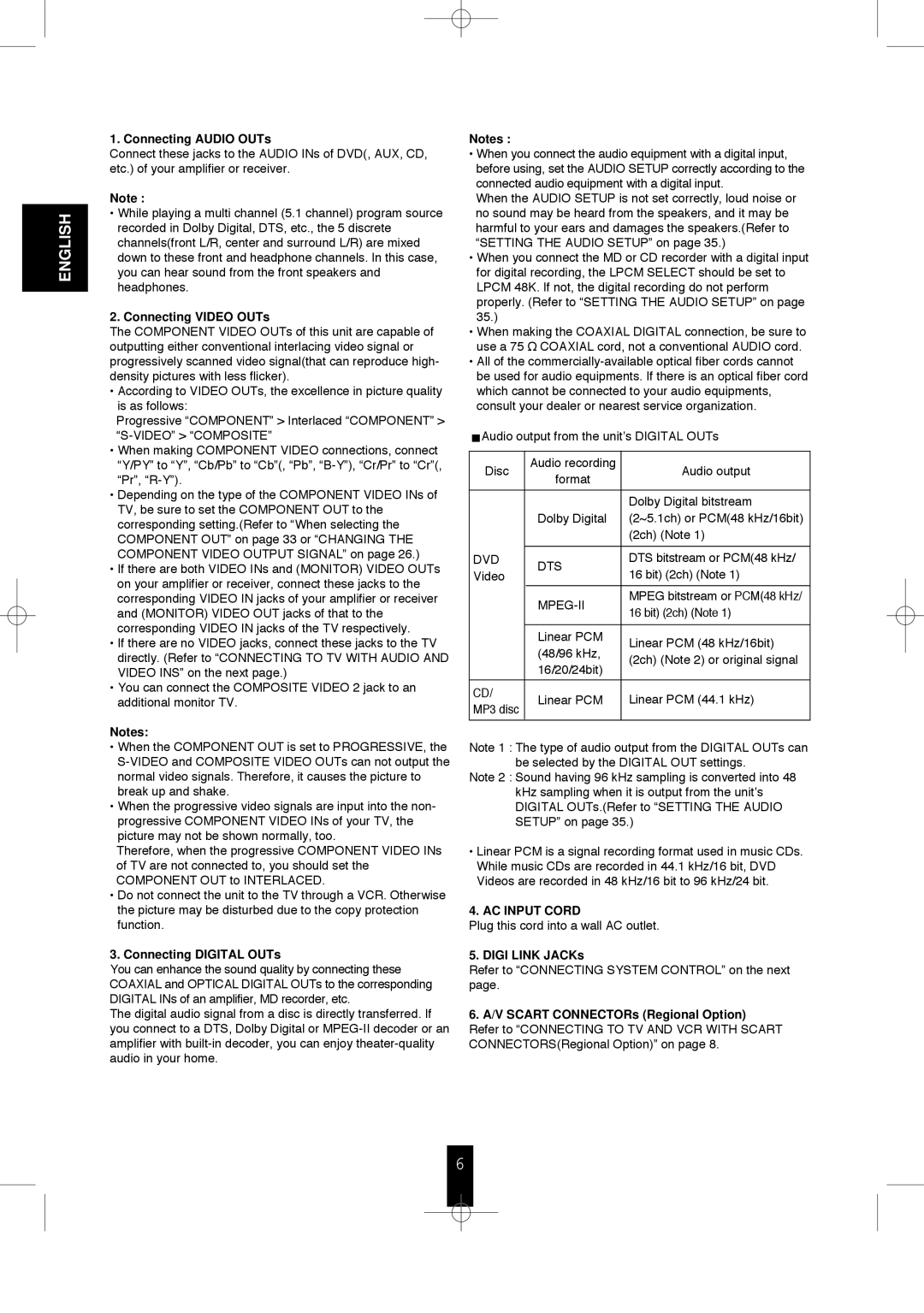
ENGLISH
1. Connecting AUDIO OUTs
Connect these jacks to the AUDIO INs of DVD(, AUX, CD, etc.) of your amplifier or receiver.
Note :
•While playing a multi channel (5.1 channel) program source recorded in Dolby Digital, DTS, etc., the 5 discrete channels(front L/R, center and surround L/R) are mixed down to these front and headphone channels. In this case, you can hear sound from the front speakers and headphones.
2. Connecting VIDEO OUTs
The COMPONENT VIDEO OUTs of this unit are capable of outputting either conventional interlacing video signal or progressively scanned video signal(that can reproduce high- density pictures with less flicker).
•According to VIDEO OUTs, the excellence in picture quality is as follows:
Progressive “COMPONENT” > Interlaced “COMPONENT” >
•When making COMPONENT VIDEO connections, connect “Y/PY” to “Y”, “Cb/Pb” to “Cb”(, “Pb”,
•Depending on the type of the COMPONENT VIDEO INs of TV, be sure to set the COMPONENT OUT to the corresponding setting.(Refer to “When selecting the COMPONENT OUT” on page 33 or “CHANGING THE COMPONENT VIDEO OUTPUT SIGNAL” on page 26.)
•If there are both VIDEO INs and (MONITOR) VIDEO OUTs on your amplifier or receiver, connect these jacks to the corresponding VIDEO IN jacks of your amplifier or receiver and (MONITOR) VIDEO OUT jacks of that to the corresponding VIDEO IN jacks of the TV respectively.
•If there are no VIDEO jacks, connect these jacks to the TV directly. (Refer to “CONNECTING TO TV WITH AUDIO AND VIDEO INS” on the next page.)
•You can connect the COMPOSITE VIDEO 2 jack to an additional monitor TV.
Notes:
•When the COMPONENT OUT is set to PROGRESSIVE, the
•When the progressive video signals are input into the non- progressive COMPONENT VIDEO INs of your TV, the picture may not be shown normally, too.
Therefore, when the progressive COMPONENT VIDEO INs of TV are not connected to, you should set the COMPONENT OUT to INTERLACED.
•Do not connect the unit to the TV through a VCR. Otherwise the picture may be disturbed due to the copy protection function.
3. Connecting DIGITAL OUTs
You can enhance the sound quality by connecting these COAXIAL and OPTICAL DIGITAL OUTs to the corresponding DIGITAL INs of an amplifier, MD recorder, etc.
The digital audio signal from a disc is directly transferred. If you connect to a DTS, Dolby Digital or
Notes :
•When you connect the audio equipment with a digital input, before using, set the AUDIO SETUP correctly according to the connected audio equipment with a digital input.
When the AUDIO SETUP is not set correctly, loud noise or no sound may be heard from the speakers, and it may be harmful to your ears and damages the speakers.(Refer to “SETTING THE AUDIO SETUP” on page 35.)
•When you connect the MD or CD recorder with a digital input for digital recording, the LPCM SELECT should be set to LPCM 48K. If not, the digital recording do not perform properly. (Refer to “SETTING THE AUDIO SETUP” on page 35.)
•When making the COAXIAL DIGITAL connection, be sure to use a 75 Ω COAXIAL cord, not a conventional AUDIO cord.
•All of the
![]() Audio output from the unit’s DIGITAL OUTs
Audio output from the unit’s DIGITAL OUTs
Disc | Audio recording | Audio output | |
format | |||
|
| ||
|
|
| |
|
| Dolby Digital bitstream | |
| Dolby Digital | (2~5.1ch) or PCM(48 kHz/16bit) | |
|
| (2ch) (Note 1) | |
|
|
| |
DVD | DTS | DTS bitstream or PCM(48 kHz/ | |
Video | 16 bit) (2ch) (Note 1) | ||
| |||
|
|
| |
|
| MPEG bitstream or PCM(48 kHz/ | |
| 16 bit) (2ch) (Note 1) | ||
|
| ||
|
|
| |
| Linear PCM | Linear PCM (48 kHz/16bit) | |
| (48/96 kHz, | ||
| (2ch) (Note 2) or original signal | ||
| 16/20/24bit) | ||
|
| ||
|
|
| |
CD/ | Linear PCM | Linear PCM (44.1 kHz) | |
MP3 disc | |||
|
| ||
|
|
|
Note 1 : The type of audio output from the DIGITAL OUTs can be selected by the DIGITAL OUT settings.
Note 2 : Sound having 96 kHz sampling is converted into 48 kHz sampling when it is output from the unit’s DIGITAL OUTs.(Refer to “SETTING THE AUDIO SETUP” on page 35.)
•Linear PCM is a signal recording format used in music CDs. While music CDs are recorded in 44.1 kHz/16 bit, DVD Videos are recorded in 48 kHz/16 bit to 96 kHz/24 bit.
4. AC INPUT CORD
Plug this cord into a wall AC outlet.
5. DIGI LINK JACKs
Refer to “CONNECTING SYSTEM CONTROL” on the next page.
6. A/V SCART CONNECTORs (Regional Option) Refer to “CONNECTING TO TV AND VCR WITH SCART CONNECTORS(Regional Option)” on page 8.
6
